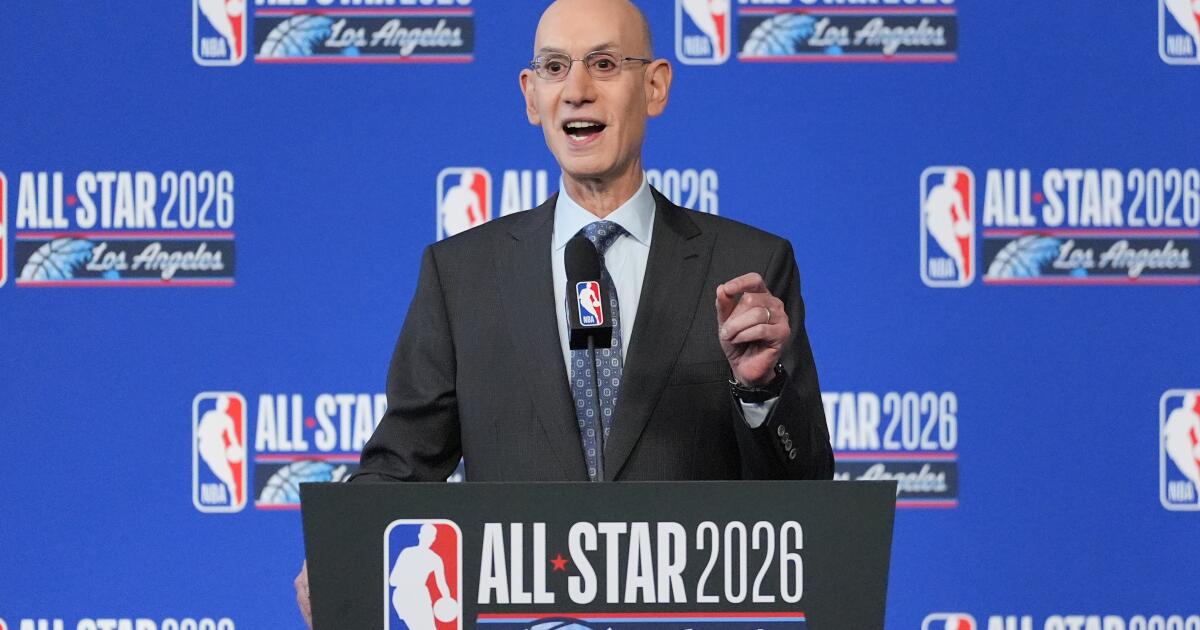Adam Silver says NBA seeking ‘every possible remedy’ to stop tanking
NBA commissioner Adam Silver believes teams are tanking more aggressively than in recent years and is considering many possible remedies to ensure real competition, from taking away draft picks to making wholesale changes to the draft and the lottery.
Silver immediately addressed the hottest topic in NBA circles Saturday in his annual address during All-Star Weekend at Intuit Dome, making it clear the NBA will do almost anything to make sure its teams earnestly compete.
Last Thursday, the league issued a $500,000 fine to the Utah Jazz and a $100,000 penalty to the Indiana Pacers for sitting healthy players, believing their apparent tanking actions compromised the league’s competitive integrity.
“Are we seeing behavior that is worse this year than we’ve seen in recent memory? Yes, is my view,” Silver said. “Which was what led to those those fines, and not just those fines, but to my statement that we’re going to be looking more closely at the totality of all the circumstances this season in terms of teams’ behavior, and very intentionally wanted teams to be on notice.”
Silver knows strong words and six-figure fines might not be nearly enough to compel struggling teams to commit to real competition instead of improving their odds in what’s expected to be one of the deepest drafts in recent history — and that’s why the NBA is looking at stronger solutions.
“The league is 80 years old, it’s time to take a fresh look at this and to see whether that’s an antiquated way of going about doing it,” Silver said of draft process. “Ultimately, we need a system to fairly distribute players. It’s in the players’ interest as well as the teams’ that you have a level of parity around the league. There’s only so many jobs and so many cities, but we’ve got to look at some fresh thinking here. I mean, what we’re doing, what we’re seeing right now, is not working.”
The NBA’s competition committee is reexamining the structure of the draft lottery for ways to minimize the upside of tanking, Silver said. The commissioner also acknowledged the fines could be followed by the revocation of draft picks from tanking teams.
“There is talk about every possible remedy now to stop this behavior,” Silver said.
Yet Silver also acknowledged the essential dilemma at the heart of this problem, one that has bedeviled the league since the 1960s: A team’s draft position is significantly tied to its chances of building a winner.
“It’s so clear that the incentives are misaligned,” Silver said. “My caveat is, and this is where teams are in a difficult place … that the worst place to be, for example, is a middle-of-the-road team. Either be great or be bad, because then [being bad] will help you with the draft. In many cases, you have fans of those teams, it’s not what they want to pay for, to see poor performance on the floor, but they’re actually rooting for their teams, in some cases, to be bad to improve their draft chances.”
But Silver intends to remind every team that tanking is a betrayal of its relationship with fans, both in their home cities and around the world.
In other topics covered by Silver on Saturday:
Expansion grows closer
The NBA still expects to make decisions on expansion this year, starting with more discussions at the Board of Governors meeting next month. The league won’t vote on expansion then, but Silver expects to know whether the league will move on to talk with potential owners.
Silver acknowledged Seattle and Las Vegas are the obvious candidates for expansion and said the league wants to make a decision soon: “I don’t want to tease cities or mislead anyone.”
Clippers investigation
Silver said he has been told the Clippers have been cooperative with the external investigation into their possible circumvention of the salary cap through a suspicious endorsement deal for Kawhi Leonard with a now-bankrupt company.
Silver firmly stated that the investigation and its findings were not purposely delayed while the Clippers host All-Star weekend. Wachtell Lipton, the Manhattan law firm conducting the investigation, has no deadline to produce its findings.
Prediction markets
The NBA is “paying an enormous amount of attention” to the rise of prediction markets, particularly after Milwaukee superstar Giannis Antetokounmpo sparked concern with his investment in Kalshi. Silver didn’t find fault with Antetokounmpo — whose shares are a “minuscule” position, according to Silver — but acknowledged the looming specter of the gambling industry without suggesting a solution.
“It concerns me in the totality of all this betting that we need a better handle, no pun intended, on all the different activity that’s happening out there,” Silver said.
Silver also acknowledged the overwhelming size of this task, given that roughly 80 countries allow betting on the NBA while billions more are wagered illegally.
Europe calling
The NBA’s desire to open a European league in partnership with FIBA remains strong, and it still would love to start in October 2027, but Silver acknowledged many hurdles remain.
The league still is working with the players union to determine whether active players will be allowed to invest in NBA Europe franchises — something that would be welcomed by many top players, including Antetokounmpo.
“If there’s an opportunity that comes across my desk to be an owner in sports, I would consider it 100%,” the Greek star said Saturday. “In the real NBA, I don’t know if I have that type of money … but I love basketball, and anywhere that I can be involved with it, I would love it.”
